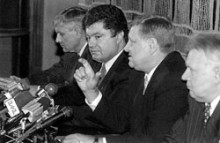On November 18 Kyiv hosted the unifying congress of the Labor Solidarity of Ukraine Party incorporating five centrist parties: the Regional Revival Party, Party of Labor, Ukrainian Solidarity Party, Beautiful Ukraine, and the All-Ukrainian Party of Pensioners.
As long ago as last June the leaders of these five political organizations announced their intent to unite in a single centrist political party on the basic of a joint program and platform. As reported earlier, “the congress had been put off a month “for organizational reasons.” Petro POROSHENKO, leader of the Ukrainian Solidarity Party, told The Day, “ The political parties participating in the process of unification had failed to hold all oblast-level meetings” by the date in October for which the congress had originally been scheduled.
The press center of the parties being united quotes People’s Deputy Volodymyr Semynozhenko, chief editor of the new association’s program documents, as saying that the new united party “will offer society an action program meeting the new requirements and challenges of the time, and combining individual freedom, a socially-responsible state, and an innovative society.” The new party association, as was stressed repeatedly at the congress, is based on a new centrist ideology. According to Semynozhenko, “the classical patterns no longer work. So a new Centrism is an ideology that corresponds to world development. Our new program is a modern ideological platform which, instead of splitting Ukraine’s political forces into Left and Right, unites them.”
The new united centrist party should become one of the most influential political forces in the state, which will have an impact on the formation of Verkhovna Rada and the executive bodies, People’s Deputy Poroshenko told the congress. In his opinion, this is a doable task because the majority of Ukraine’s population share the ideological principles on which the united party rests.
The lawmaker also pointed out that the “destructive multiparty system” has become a negative factor in Ukraine’s development. He claims most of the parties are small in number of members and enjoy neither respect nor influence in society. In support of this, he noted that the existing 107 parties comprise a mere 2% of Ukraine’s population. In this connection, Poroshenko thinks the only possible way out of the situation is drastic reduction of the number of parties in this country by means of the unification of ideologically similar ones. He said the main thing in this case is the ability of such parties to put forward new-style leaders, adding that the new party strives to unite all the forces supporting statehood but without radical leftist or radical rightist views. He also pointed out that “political and legal cleanliness” should be the main criterion for party membership. As he put it, the united party’s motto will be: the state for the people, not vice versa.
Volodymyr RYBAK, chairman of the Regional Renaissance Party of Ukraine, said, addressing the congress, that one of the main tasks Ukraine is now facing is constructing an optimal model of regional policies and enhancing the role and importance of regions in shaping governmental policy. Mr. Poroshenko said at the press conference that the united party “will rely on the regions” and that “regional organizations will play the leading role in unification.”
Practically all congress delegates agreed that the party should have one leader and the current tentative name of the association is too long and unacceptable from the angle of election techniques. Commenting on such points in the speeches, Mr. Poroshenko promised that party members will choose one name, “short as a gunshot,” and one leader by the time of the next congress. For the time being, the congress solved these problems “without bloodshed,” leaving intact the temporary name obtained by almost a mechanistic mixing of the names of the constituent organizations and electing as chairmen Volodymyr Rybak of PRVU, Valentyn Landyk of the Labor Party, and Petro Poroshenko of the Solidarity Party as cochairmen of the new party.
Asked whether the new party may join forces with other political entities, Mr. Poroshenko said “it is up to the united party’s presidium and political council to decide with whom precisely to join forces or form alliances. We have stated we are ready for cooperation with all constructive forces not dogmatic and aiming to create a civilized civil society in Ukraine and make it a civilized European state.”
The congress decided that the party’s main task is to undertake long-term political work aimed at building a developed civil society, promoting and accelerating the government’s regional policy, achieving full-fledged political representation of regional interests in the national bodies of power, and a clear separation of powers between the center and the regions, between the central and local authorities. The new party is apparently trying to make a name for itself from the practical perspective also, for the congress instructed the party leadership to submit to Verkhovna Rada proposals on improving the election system and taking into fuller account regional interests when approving the 2001 budget as well as to send to the government a draft package of urgent measures aimed at securing economic rights.







